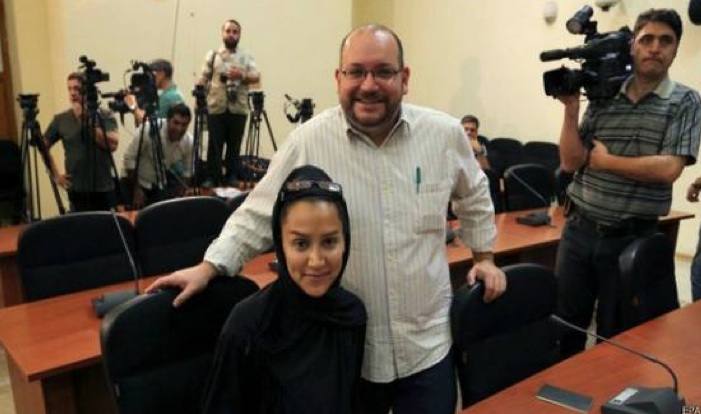
Washington Post journalist Jason Rezaian and his Iranian wife Yeganeh Salehi in Tehran in September 2013. Rezaian, a dual Iranian-American citizen, has been been jailed since July last year on charges including espionage. Photograph: EPA/STR
06.13.2015 – THE IRISH TIMES – Simon Carswell – Today is US-born ‘Washington Post’ correspondent Jason Rezaian’s 326th day in jail
Jason Rezaian’s article in the Washington Post on July 17th, 2014 was a charming colour feature about how a growing number of Iranians were embracing America’s favourite pastime, baseball.
He quoted the first baseman on Iran’s national team, Younes Fathizadeh, and coach Mehrdad Hajian, and wrote that at the end of every practice session the players forage for the foul balls hit into the woods surrounding Tehran’s only baseball diamond.
This is how each practice ends, Hajian remarked. “Six years ago I bought a thousand balls. I’ve got about 20 left,” he told Rezaian.
The journalist ended his feature saying that the Iranians wanted to host American players or to send a team to the US for exhibition games.
“This kind of diplomacy can have a very positive impact on our work,” Alireza Adib, president of Iran’s Baseball Association, told him.
Five days after the article appeared, Rezaian (39), the Post’s Tehran correspondent since 2012, and his Iranian wife Yeganeh Salehi were arrested by the Iranian authorities.
He has been held ever since in Tehran’s notorious Evin Prison, famous for detaining political prisoners, academics and intellectuals, and for the torture, ill treatment and neglect of inmates. His wife, a photojournalist, and the others detained with him were later released.
Rezaian, who born in California and holds dual Iranian-American citizenship, has been held in an Iranian jail longer than any other western journalist. His brother Ali has said he is held in isolation and has lost 40 pounds.
Rezaian’s family and employer are mystified about why he was arrested in the first place. To them, he was simply doing his job, reporting on Iran for a foreign audience, chronicling how Iranians make a living, have fun and spend time with their family.
“He was trying to reflect that these are human beings who live there, that this society does not lend itself to caricature and shouldn’t be viewed in a one- dimensional way,” says Washington Post executive editor Marty Baron, sitting in his office not far from the White House.
Unjustly imprisoned
The reporter’s plight has been raised at the highest levels. In April, president Barack Obama said that Rezaian was “unjustly imprisoned.”
Five days earlier, the Iranian authorities disclosed the precise charges against Rezaian for the first time since his arrest. They include accusations of “espionage”, “collaborating with hostile governments” and “propaganda against the establishment.”
According to his lawyer, the Iranians allege that Rezaian gathered information “about internal and foreign policy” and provided it to “individuals with hostile intent”.
“Some of these charges read like what journalists are supposed to do,” says Baron. “Writing about the internal and foreign policy of Iran – isn’t that what a journalist does? . . . Everything he has done has been in the normal course of being a journalist.
“Maybe in the minds of a conspiratorialist, they can see all sorts of terrible things in that. But that is what we do and he was an accredited journalist and he had been a journalist there for quite some time.”
Last Monday the second hearing in Rezaian’s trial took place, again behind closed doors. Iran’s quasi-official Tasnim news agency reported that Rezaian defended himself and that part of his defence was in English, which was translated into Farsi by a translator.
Closed trial
According to Baron, the reporter was not allowed to pick his own lawyer and the one he chose from a list designated by the court had only an hour and a half with him prior to the start of his trial, which is closed to outsiders.
“This is not a system of justice; it is a system of injustice,” Baron says.
The trial comes at a sensitive time in Iranian-American relations, as six of the world’s leading powers seek to conclude an agreement with Iran on its nuclear programme before a June 30th deadline.
Rezaian is being held by the Revolutionary Guard and being tried in the Islamic Revolutionary Courts. It has been speculated that he is a victim of an internal struggle within Iran, that the Revolutionary Guard might be prosecuting Rezaian to embarrass Iranian president Hassan Rouhani and undermine the nuclear talks.
US secretary of state John Kerry is said to have continuously raised Rezaian’s case with the Iranians on the fringes of the negotiations, though his release is not being made a condition of the nuclear deal.
Today marks Rezaian’s 326th day in captivity, held for trying to report beyond the common stereotype of what outsiders perceive life to be like in the Islamic Republic.
“His own treatment,” says Baron, “ has reinforced the worst possible image of Iran.”

Hey there! I know this is kind of off topic but I was
wondering which blog platform are you using for this site?
I’m getting tired of WordPress because I’ve had problems with hackers and I’m
looking at alternatives for another platform.
I would be awesome if you could point me in the direction of a good
platform.